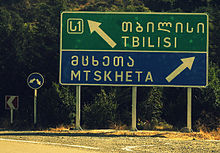Romanization of Georgian: Difference between revisions
FactStraight (talk | contribs) Undid revision 665717967 by 71.223.46.117 (talk) |
|||
| Line 1: | Line 1: | ||
[[File:Road Sign in Latin and Georgian.jpg|thumb|[[Mtskheta]] and [[Tbilisi]] romanized.]] |
[[File:Road Sign in Latin and Georgian.jpg|thumb|[[Mtskheta]] and [[Tbilisi]] romanized.]] |
||
'''Romanization of |
'''Romanization of Georgian''' is the process of [[transliterating]] the [[Georgian language]] from the [[Georgian script]] into the [[Latin script]]. |
||
== Georgian national system of romanization == |
== Georgian national system of romanization == |
||
Revision as of 06:52, 6 June 2015

Romanization of Georgian is the process of transliterating the Georgian language from the Georgian script into the Latin script.
Georgian national system of romanization
This system, adopted in February 2002 by the State Department of Geodesy and Cartography of Georgia and the Institute of Linguistics, Georgian National Academy of Sciences, establishes a transliteration system of the Georgian letters in Latin letters.[1] The system had already been in use since 1998 on driving licenses.
Unofficial system of romanization
Despite its popularity this system sometimes leads to ambiguity. The system is mostly used in social networks, forums, chat rooms etc. The system is greatly influenced by the common case-sensitive Georgian keyboard layout that ties each key to each letter in the alphabet (seven of them: T, W, R, S, J, Z, C with the help of the shift key to make another letter).
Transliteration table
| Georgian letter | IPA | National system (2002) |
BGN/PCGN (1981) |
ISO 9984 (1996) |
ALA-LC (1997) |
Unofficial system |
|---|---|---|---|---|---|---|
| ა | /ɑ/ | a | a | a | a | a |
| ბ | /b/ | b | b | b | b | b |
| გ | /ɡ/ | g | g | g | g | g |
| დ | /d/ | d | d | d | d | d |
| ე | /ɛ/ | e | e | e | e | e |
| ვ | /v/ | v | v | v | v | v |
| ზ | /z/ | z | z | z | z | z |
| ჱ[2] | /eɪ/ | ey | ē | ē | ||
| თ | /tʰ/ | t | t' | t' | t' | T[3] or t |
| ი | /i/ | i | i | i | i | i |
| კ | /kʼ/ | k' | k | k | k | k |
| ლ | /l/ | l | l | l | l | l |
| მ | /m/ | m | m | m | m | m |
| ნ | /n/ | n | n | n | n | n |
| ჲ[2] | /i/, /j/ | j | y | y | ||
| ო | /ɔ/ | o | o | o | o | o |
| პ | /pʼ/ | p' | p | p | p | p |
| ჟ | /ʒ/ | zh | zh | ž | ž | J,[3] zh or j |
| რ | /r/ | r | r | r | r | r |
| ს | /s/ | s | s | s | s | s |
| ტ | /tʼ/ | t' | t | t | t | t |
| ჳ[2] | /uɪ/ | w | w | |||
| უ | /u/ | u | u | u | u | u |
| ფ | /pʰ/ | p | p' | p' | p' | p or f |
| ქ | /kʰ/ | k | k' | k' | k' | q or k |
| ღ | /ɣ/ | gh | gh | ḡ | ġ | g, gh or R[3] |
| ყ | /qʼ/ | q' | q | q | q | y[4] |
| შ | /ʃ/ | sh | sh | š | š | sh or S[3] |
| ჩ | /tʃ(ʰ)/ | ch | ch' | č' | č' | ch or C[3] |
| ც | /ts(ʰ)/ | ts | ts' | c' | c' | c or ts |
| ძ | /dz/ | dz | dz | j | ż | dz or Z[3] |
| წ | /tsʼ/ | ts' | ts | c | c | w, c or ts |
| ჭ | /tʃʼ/ | ch' | ch | č | č | W,[3] ch or tch |
| ხ | /x/ | kh | kh | x | x | x or kh (rarely) |
| ჴ[2] | /q/, /qʰ/ | q' | ẖ | x̣ | ||
| ჯ | /dʒ/ | j | j | ǰ | j | j |
| ჰ | /h/ | h | h | h | h | h |
| ჵ[2] | /oː/ | ō | ō |
Notes and references
- ^ United Nations Group of Experts on Geographical Names (2007). Technical reference manual for the standardization of geographical names (PDF). United Nations. p. 64. ISBN 978-92-1-161500-5. Retrieved 7 January 2013.
- ^ a b c d e Archaic letters.
- ^ a b c d e f g These are influenced by aforementioned layout, and are preferred to avoid ambiguity, as an expressions: t, j, g, ch can mean two letters.
- ^ Initially, the use of y letter for ყ is most probably due to their resemblance to each other.

